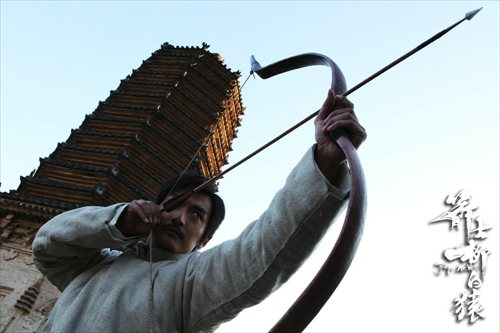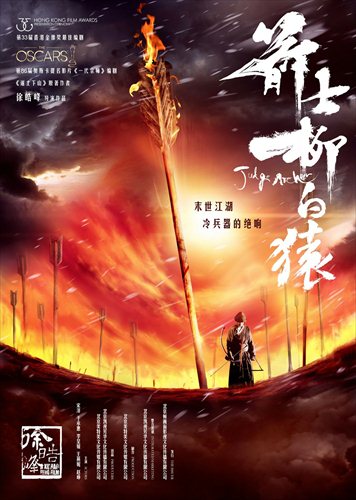Xu Haofeng’s latest film pays homage to martial arts with no-frills choreography
If there's a genre called art house kung fu, it must include 42-year-old writer-director Xu Haofeng.
If you're a fan of Wong Kar-wai's The Grandmaster (2013), which Xu co-wrote and made his name with, or his directorial project The Master last year, then you'll enjoy the even more free-flowing and ambitious directorial work that is Judge Archer.
Four years after it was completed, it has finally made it to the cinema.
Like previous Xu Haofeng films, Judge Archer is set in the early Republic of China (1912-49) period, a time when the introduction of guns and explosives to China brought an abrupt end to the glory of martial arts.
Then, masters looked for different warlords seeking work. Xu calmly depicts "the end of an era" with a mildly paced narrative that is subtle, introspective and tinged with sadness.

Actor Song Yang plays the title character in writer-director Xu Haofeng's latest venture Judge Archer. Photos: mtime.com
The 90-minute film revolves around a young man (Song Yang) who suffers from mental disorder after witnessing his sister being raped.
A monk treats him and tells him to adopt the name of the first man he meets, and thus by fate he becomes Liu Baiyuan, or the Judge Archer - the arbitrator whose duty is to dispense justice during disputes between different martial arts schools, his authority supported by his superb skill with bow and arrow.
This is a completely fictional role that Xu, who is a novelist and martial artist himself, invented very convincingly. Moreover, it is a deadly job, a target of hatred and revenge; generations of Judge Archers were cursed, including the predecessor who trains the young man.
The new Judge Archer seems unchallenged and unable to be deceived, until he agrees to avenge the murder of the revolutionist father of Chinese-Caucasian Erdong (Wang Yanni) by warlord General Yang.
Through this, he meets his bodyguard Kuang Yimin (Yu Chenghui), a once prominent martial artist, and Yue Yahong (Li Chengyuan), an opera singer for whom he develops a soft spot.
Part of the film's beauty is its structure - largely chronological, it is broken by a series of threads. For example, Judge Archer's three-year training is condensed into a few finely shot scenes inserted between his later experiences.
This arrangement also means that the biggest plot twist in fact lies right there in its opening scene. It seems Xu isn't even trying to build suspense - instead he shows his cards and nevertheless enchants the audience all the way.
Another highlight has to be the fights and duels. Xu, who is famous for his realism in martial arts films, amazes yet again with wonderfully concise and precise movements and gestures, powered by his no-special-effects, no-frills, no-stunt-double psychology.
Xu's minimalism and expressionism, instead of spectacles, pay respect to the ancient art that faded out after this era. He gives an intangible cultural heritage a new life that it deserves, in cinema.
Each fight is worth full attention, but the two most important duels - one between Kuang and his disciple-enemy Guo Decheng (Zhao Zheng), and one between Kuang and Judge Archer - could become classics.
The former holds details of weaponry, rituals and rules, something Xu never explains but just simply shows. The latter sees the two masters on opposite ends of a breathtaking landscape, Kuang moving forward as he fends off Judge Archer's arrows one after another, before finally dueling at close distance. First-class cinematography enhances their strengths.
One drawback of Xu, however, is his portrayal of women characters. Despite that it is common to openly exploit women's sexuality on-screen, it is still a pity that there is little more than just that.
This is especially so with Erdong, who over time becomes an often out-of-place plot device and a cause for a few seemingly unnecessary fight scenes that some viewers might find amusing.
Xu might have some problems with developing characters, but he is solid in casting. Everyone feels just right, and Song Yang, who stars in each of Xu's films, is the best one could ask for.
It is a delight to see a Chinese actor of his generation who really has it all - impeccable looks, a rare mixture of effortlessness and solemnity, and excellence in both delivery and action. He is one of the greatest reasons to expect more from the polymathic and talented director.

A poster for the film
Everyone's a critic
GT: Many found the free-flowing narrative hard to comprehend. Is that a problem for you?
Miss Zhuang, 29, data analyst
"There are certainly lines and paths that seem a bit confusing at first, but I like how things start to make sense in hindsight. Also, it gives me a lot to reflect on after one viewing, and gives me an appetite to revisit it."
GT: The film is filled with imagery. What's your favorite?
Jen, 31, furniture designer
"The giant tree on which Judge Archer practices archery, which stands so quietly but formidably, is hard to forget. I also like the shot of the dagger the protagonist throws into the mirror reflecting his target. It is beautiful, and feels more poignant each time it happens."
GT: What do you consider the highlight of the film?
Wu Xia, 28, IT
"Definitely the fight scenes, which is what really separates Xu from other directors. It's great to lose the gravity-defying moves and just admire these simple yet powerful and dexterous movements. I suppose they are what the lost forms of martial arts would have looked like in real life, and I am so thankful to Xu for that."
Newspaper headline: Judge Archer